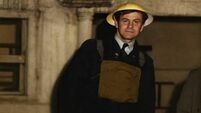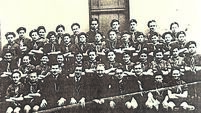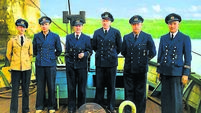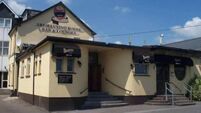Throwback Thursday: 70 years ago Moby Dick was filmed in Cork
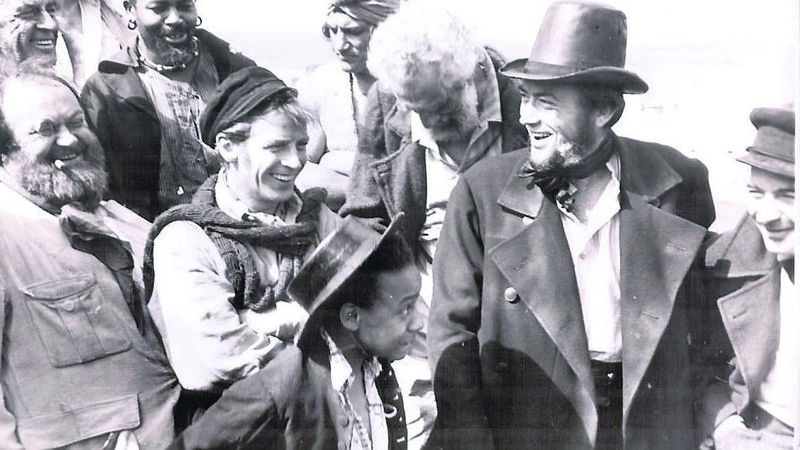
The blockbuster movie Moby Dick, starring Gregory Peck and Noel Purcell, filming in Youghal, July 1954. Pictures courtesy of Michael Hackett
AS you will have seen over the past week, The Echo and EchoLive.ie has been celebrating all that is great about our wonderful Cork coastline, and here on Throwback Thursday we have been enjoying immensely the recollections sent in by readers. Day trips to the beach, holiday homes, fishing, swimming, making sand castles – all form part of unforgettable memories granted to us by living so near to the sea.
Do you know, this year marks the 70th anniversary of Moby Dick being filmed in Youghal? Yes, John Huston spotted the possibilities of this historic fishing town when he was planning a screen version of Melville’s classic novel (Ray Bradbury actually wrote the screenplay, and legend says that he and Huston fought constantly over its interpretation). Searching all over Ireland for “a port that hadn’t changed in a hundred years,” Huston knew, once he set eyes on that waterfront, that he had found the ideal place.
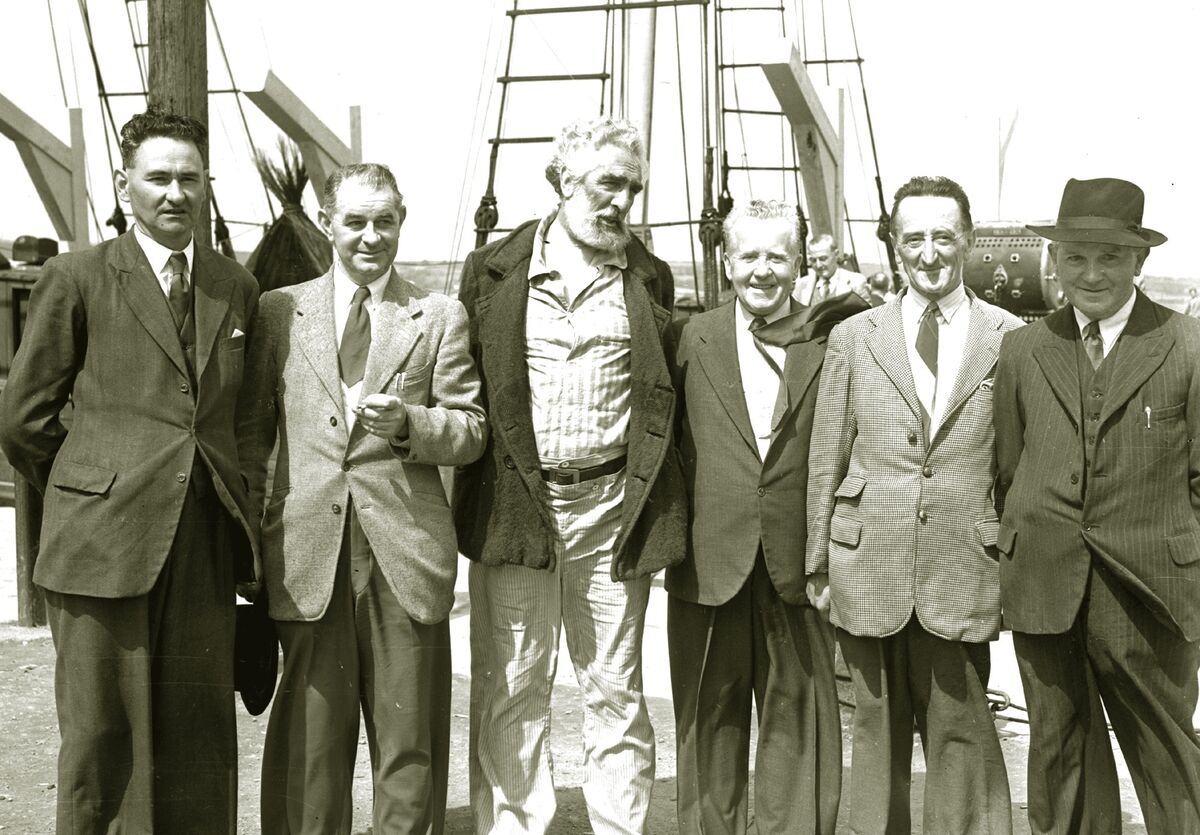
During the progress of shooting, stars like Gregory Peck and Richard Basehart could be seen wandering the streets, while locals were delighted to be roped in as extras, and even the buildings took on an entirely different guise, being draped in painted canvases, the more accurately to resemble 1800s New Bedford in Massachusetts. Katie O’Brien remembers vividly seeing all this as a child.
“We were staying down in a boarding house up above the town, and I would walk in with my mother to get the shopping.
I was fascinated by the canvas house fronts and the crowds on the quaysides for shooting scenes. For me it awakened a lifetime’s interest in location filming!
For the thrilling hunt scenes, a marvellous model whale, 75ft long, weighing 12 tons, and requiring 80 drums of compressed air plus a hydraulic system to remain afloat and operational, was constructed by Dunlop in Stoke on Trent. At one point, this artificial whale came loose from its tow-line and drifted away to be lost in a fog!
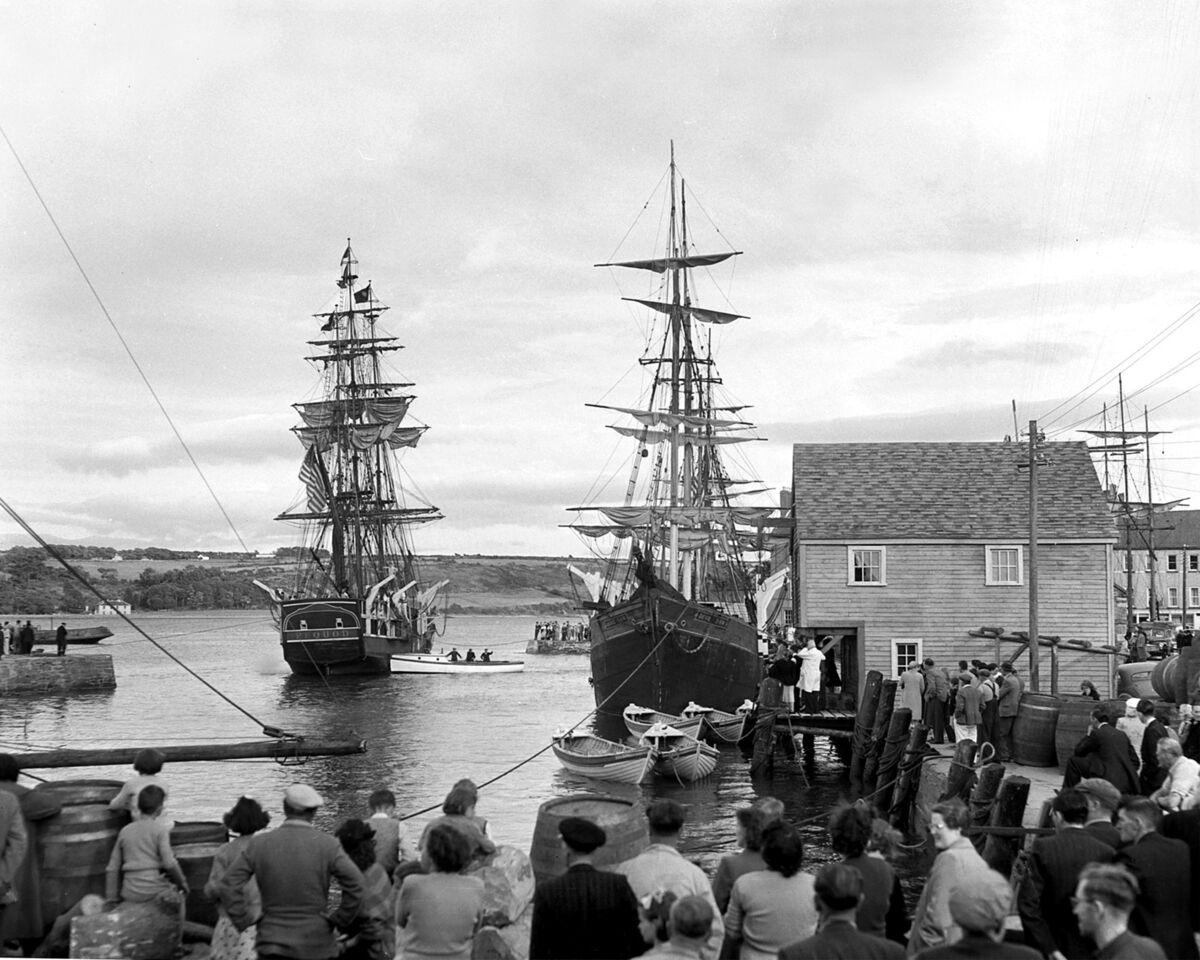
Tim Cagney never felt the urge to chase Moby Dick. His passion in younger days was for somewhat smaller fry.
“Many years ago, I used to enjoy the sport of angling. This was mostly of the freshwater variety, catching sea-trout in the Glashaboy river, at Glanmire. Now and again, however, myself and my fishing-buddies used to journey seaward, in pursuit of that heavenly-tasting fish known as mackerel.
“Our favourite spot was Robert’s Cove, usually in the month of August, when thousands of these creatures would chase shoals of sprat onto the rocks. One didn’t require any great angling skills to catch such piscatorial quarry – when they were in a feeding frenzy, they would eat anything.
Usually, one tied an artificial sprat to a line, which did the trick, but nearly any other inducement would work just as efficiently – I daresay if you chucked the proverbial kitchen sink into the waves, a mackerel would, most likely, grab it.
“One particularly innovative strategy, employed by one of my pals, involved stretching robber insulation (from electrical cable) over the shank of the hook. Any colour would do – even black. How the mackerel imagined this might represent food is, of course, something only a mackerel could explain, but – as I said – when these creatures were desperate for food, anything would do. Said pal extended his idea by tying six rubber-encased hooks to his line, and there was every possibility that a fish would attach itself to every one. Can you imagine the excitement of having six mackerel struggling in unison at the end of your rod? It was not unusual, on landing your mackerel, to find its mouth crammed with uneaten sprat. You could actually use these as bait on your next cast, when success was virtually guaranteed.
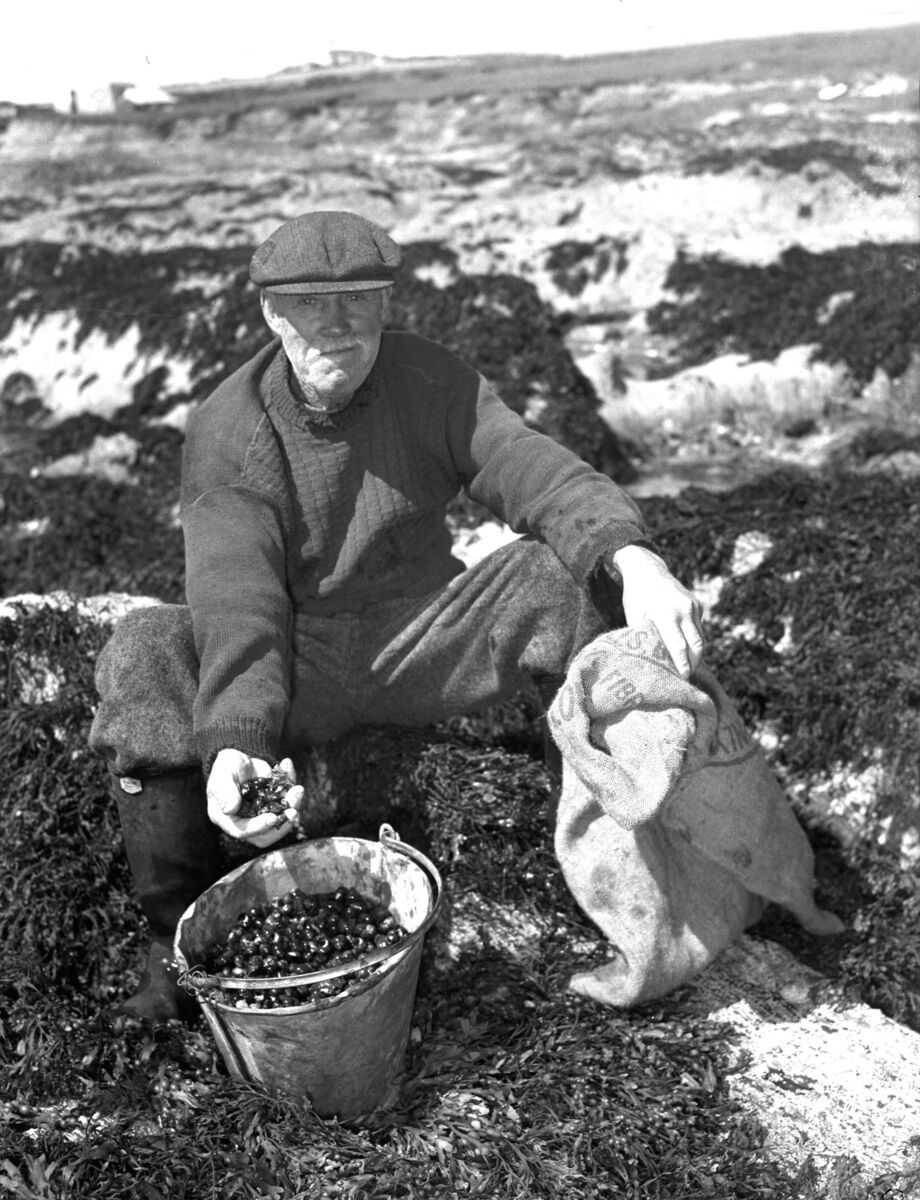
“It was fascinating to watch the surface of the water being disturbed, whenever the mackerel made a rush at the sprat – this resembled boiling, and was known as ‘a break.’ Casting your line into the middle of such turmoil was a surefire certainty that you would catch a fish (or six). The only downside of course, was that you very quickly caught more fish than you needed. There was, after all, a limit to the amount of mackerel you (and your neighbours) could eat, so if you adhered to the principle of ‘take only what you can eat,’ your stay on the rocks could very well be short-lived.
“In 1973, I moved to Dublin, and largely relinquished my interest in angling. I well remember, however, one glorious summer day in 1994 when we were invited to stay with friends at Oysterhaven. One of their kids had a rubber dinghy, complete with outboard motor, and we sallied-forth into the bay, armed with fishing-lines, baited with feathered hooks. We nabbed a few mackerel, of course, and then headed back to the house, where our catch was cooked on a barbecue and served up with new potatoes and a bottle (or two) of white wine.
I can honestly tell you that, if I had won the Lotto that day, I might well have handed it back!
“Sadly, one of my aforementioned buddies, with whom I’m still in touch, tells me that such halcyon days are gone, thanks to the activities of supertrawlers – usually from foreign lands – which plunder our coasts, effectively denuding the waters of fish. No longer, it seems, can enormous shoals of mackerel be seen, ‘breaking’ on the rocks, rushing in the direction of excited anglers. Most of the mackerel I see nowadays are on slabs in fishmongers’ establishments.”
Most breeds of fish don’t freeze well, and mackerel are particularly victim to this condition. Nothing will ever beat the taste of a mackerel, cooked within hours of being plucked from the sea. I’d be interested to hear from other (modern-day) anglers, especially those living in coastal locations, to see if they share the gloomy reports from my friend.
Now – remember Mícheál Kenefick’s memories last week of actually growing up beside the sea, at Whitegate? He mentioned “picking perries” and of course we demanded to know more. Mícheál very kindly obliged, and here is his full account of how money could be made by the seashore. He entitles it: Periwinkles and Spuds.
“One of the great money earners of our childhood, and our first access to our own cash, was picking perries. Armed with a sweet tin, an empty Blue Cross ration bag, and bread and jam sandwiches, we would head in droves, during the summer holidays, to the Long Point in search of the booty.
Getting started was the hardest bit as it seemed to take forever to fill the bottom of the tin. With a bit of luck if one happened to hit on a few nests (and managed to keep them secret), the work was pleasant, even if it was a bit hard on the back. As each tin was filled it was emptied into the bag.
It seems in memory that it never rained, was always sunny.
"A week’s picking would yield about a hundredweight to an average picker and a hundredweight was worth a pound which was a small fortune in the Fifties when the pictures cost ninepence and fags were only one and three pence for 10. There would be a constant rumour on the strand as the bags were filling up that if there were too many perries the Perriman wouldn’t take them all, and there were legendary stories of whole bags of perries being dumped if one dead winkle was found inside or, God forbid, a Horse winkle or a stone was discovered during the sample fistful. I am convinced now that the rumours were circulated deliberately to slow down the masses as the Smart Alecs filled their bags with gay abandon.
“Fridays in the village must have resembled Hannibal crossing the Alps as the perries were transported to the Sawmills, which was the collection point, on every sort of buggy, old pram and High Nellie on which we could get our hands. If the tide was out the perries would have to be watered from pools in the rocks to keep them alive for one more day as the Perriman didn’t come until Saturday. When the tide was in all we did was cover the top of the bag with a big stone and nature did the watering for us.
Once we were paid on Saturday we didn’t care much if they lived or died as they made their way to France to be eaten by daft Frenchmen who by all accounts would pay big money for the simple periwinkles picked on the Long Point by the children from Whitegate!
“Having done more watering on Saturday to keep them alive (and we were cute enough to realise they would weigh a little better when wet), we would sit on the quay wall with eyes glued to the bend on the road watching for the Perriman who came from Ballycotton in a truck complete with weighing scales and a huge variety of weights. Sure enough he would arrive and our hearts would be in our mouths as he took the bags one by one to be weighed. What would we do if, when he takes the sample fistful, he comes across a stone or a corpse or the dreaded Horse which was guaranteed to kill instantly on consumption? Our fears were always unfounded and the cash was handed over instantly.
“Anything over a pound was wonderful as the bonus few shillings could be spent immediately and wantonly leaving the two ten shilling notes intact thereby guaranteeing three nights at the pictures, a few smokes, lemonade and sweets for the week! What more could any Fifties kid wish for?
“Many years later, in a very good restaurant, I was amazed to see, amongst the pre-dinner snacks on the table, a bowl of periwinkles, bringing memories of The Long Point flooding back. Despite having had a wonderful dinner which was perfect in every way it couldn’t compare to the most magnificent taste in the world which remains unequalled to this day. There has never been anything to beat the taste of bread and jam, on a sunny day at the perries, combined with a taste of salt water and seaweed on one’s hands.
“Even more lucrative than picking perries was picking spuds except that the season was very short. Five shillings a day for average pickers and an un-precedented seven and six for good pickers. The work was also hard and backbreaking but we would have almost picked them for nothing just for the thrill of the spin in the back of the truck to and from the field. One five shilling gang would be in almost constant engagement with another five shilling gang, flinging the small spuds as another drill was opened, which necessitated the farmer’s back being turned. There seemed to be an unwritten rule that the seven and sixpenny ‘men’ were left to get on with the work, apart from the odd belt of a stray missile which, if the full truth were ever to come out at a Tribunal, may not have been so stray at all!
“We now had real money and not only could we afford the pictures in Aghada we could, if we left Devotions a few minutes early on Sunday evenings, make the bus to Midleton where black and white was a thing of the past, there were soft seats instead of ninepenny benches, and we never again cheered when the ‘calvary’ arrived, thundering over a hillside to rescue the besieged good guys. It’s a sad fact, as soon as we had the price of the bus to travel further afield, we commenced the beginning of the end of our childhood. Yet even to this day, I have to pause for a second before I can pronounce the correct word, ‘cavalry.’ Ah, great days of innocence and ease.”
Wonderful memories. Send us your recollections of long ago summers. Email jokerrigan1@gmail.com. Or leave a comment on our Facebook page: https://www.facebook.com/echolivecork.
